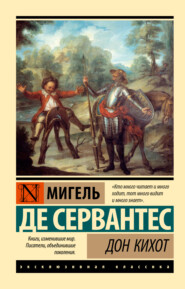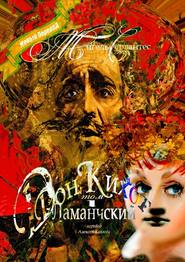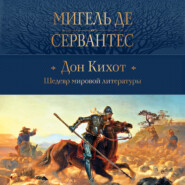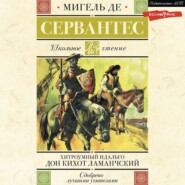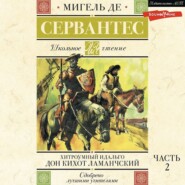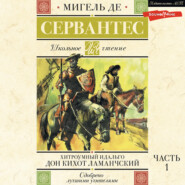По всем вопросам обращайтесь на: info@litportal.ru
(©) 2003-2025.
✖
The History of Don Quixote, Volume 2, Part 22
Настройки чтения
Размер шрифта
Высота строк
Поля
"There is no rule without an exception," said Don Lorenzo; "there may be some who are poets and yet do not think they are."
"Very few," said Don Quixote; "but tell me, what verses are those which you have now in hand, and which your father tells me keep you somewhat restless and absorbed? If it be some gloss, I know something about glosses, and I should like to hear them; and if they are for a poetical tournament, contrive to carry off the second prize; for the first always goes by favour or personal standing, the second by simple justice; and so the third comes to be the second, and the first, reckoning in this way, will be third, in the same way as licentiate degrees are conferred at the universities; but, for all that, the title of first is a great distinction."
"So far," said Don Lorenzo to himself, "I should not take you to be a madman; but let us go on." So he said to him, "Your worship has apparently attended the schools; what sciences have you studied?"
"That of knight-errantry," said Don Quixote, "which is as good as that of poetry, and even a finger or two above it."
"I do not know what science that is," said Don Lorenzo, "and until now I have never heard of it."
"It is a science," said Don Quixote, "that comprehends in itself all or most of the sciences in the world, for he who professes it must be a jurist, and must know the rules of justice, distributive and equitable, so as to give to each one what belongs to him and is due to him. He must be a theologian, so as to be able to give a clear and distinctive reason for the Christian faith he professes, wherever it may be asked of him. He must be a physician, and above all a herbalist, so as in wastes and solitudes to know the herbs that have the property of healing wounds, for a knight-errant must not go looking for some one to cure him at every step. He must be an astronomer, so as to know by the stars how many hours of the night have passed, and what clime and quarter of the world he is in. He must know mathematics, for at every turn some occasion for them will present itself to him; and, putting it aside that he must be adorned with all the virtues, cardinal and theological, to come down to minor particulars, he must, I say, be able to swim as well as Nicholas or Nicolao the Fish could, as the story goes; he must know how to shoe a horse, and repair his saddle and bridle; and, to return to higher matters, he must be faithful to God and to his lady; he must be pure in thought, decorous in words, generous in works, valiant in deeds, patient in suffering, compassionate towards the needy, and, lastly, an upholder of the truth though its defence should cost him his life. Of all these qualities, great and small, is a true knight-errant made up; judge then, Senor Don Lorenzo, whether it be a contemptible science which the knight who studies and professes it has to learn, and whether it may not compare with the very loftiest that are taught in the schools."
"If that be so," replied Don Lorenzo, "this science, I protest, surpasses all."
"How, if that be so?" said Don Quixote.
"What I mean to say," said Don Lorenzo, "is, that I doubt whether there are now, or ever were, any knights-errant, and adorned with such virtues."
"Many a time," replied Don Quixote, "have I said what I now say once more, that the majority of the world are of opinion that there never were any knights-errant in it; and as it is my opinion that, unless heaven by some miracle brings home to them the truth that there were and are, all the pains one takes will be in vain (as experience has often proved to me), I will not now stop to disabuse you of the error you share with the multitude. All I shall do is to pray to heaven to deliver you from it, and show you how beneficial and necessary knights-errant were in days of yore, and how useful they would be in these days were they but in vogue; but now, for the sins of the people, sloth and indolence, gluttony and luxury are triumphant."
"Our guest has broken out on our hands," said Don Lorenzo to himself at this point; "but, for all that, he is a glorious madman, and I should be a dull blockhead to doubt it."
Here, being summoned to dinner, they brought their colloquy to a close. Don Diego asked his son what he had been able to make out as to the wits of their guest. To which he replied, "All the doctors and clever scribes in the world will not make sense of the scrawl of his madness; he is a madman full of streaks, full of lucid intervals."
They went in to dinner, and the repast was such as Don Diego said on the road he was in the habit of giving to his guests, neat, plentiful, and tasty; but what pleased Don Quixote most was the marvellous silence that reigned throughout the house, for it was like a Carthusian monastery.
When the cloth had been removed, grace said and their hands washed, Don Quixote earnestly pressed Don Lorenzo to repeat to him his verses for the poetical tournament, to which he replied, "Not to be like those poets who, when they are asked to recite their verses, refuse, and when they are not asked for them vomit them up, I will repeat my gloss, for which I do not expect any prize, having composed it merely as an exercise of ingenuity."
"A discerning friend of mine," said Don Quixote, "was of opinion that no one ought to waste labour in glossing verses; and the reason he gave was that the gloss can never come up to the text, and that often or most frequently it wanders away from the meaning and purpose aimed at in the glossed lines; and besides, that the laws of the gloss were too strict, as they did not allow interrogations, nor 'said he,' nor 'I say,' nor turning verbs into nouns, or altering the construction, not to speak of other restrictions and limitations that fetter gloss-writers, as you no doubt know."
"Verily, Senor Don Quixote," said Don Lorenzo, "I wish I could catch your worship tripping at a stretch, but I cannot, for you slip through my fingers like an eel."
"I don't understand what you say, or mean by slipping," said Don Quixote.
"I will explain myself another time," said Don Lorenzo; "for the present pray attend to the glossed verses and the gloss, which run thus:
Could 'was' become an 'is' for me,
Then would I ask no more than this;
Or could, for me, the time that is
Become the time that is to be! —
GLOSS
Dame Fortune once upon a day
To me was bountiful and kind;
But all things change; she changed her mind,
And what she gave she took away.
O Fortune, long I've sued to thee;
The gifts thou gavest me restore,
For, trust me, I would ask no more,
Could 'was' become an 'is' for me.
No other prize I seek to gain,
No triumph, glory, or success,
Only the long-lost happiness,
The memory whereof is pain.
One taste, methinks, of bygone bliss
The heart-consuming fire might stay;
And, so it come without delay,
Then would I ask no more than this.
I ask what cannot be, alas!
That time should ever be, and then
Come back to us, and be again,
No power on earth can bring to pass;
For fleet of foot is he, I wis,
And idly, therefore, do we pray
That what for aye hath left us may
Become for us the time that is.
Perplexed, uncertain, to remain
'Twixt hope and fear, is death, not life;
'Twere better, sure, to end the strife,
And dying, seek release from pain.
And yet, thought were the best for me.
Anon the thought aside I fling,
And to the present fondly cling,
And dread the time that is to be."
When Don Lorenzo had finished reciting his gloss, Don Quixote stood up, and in a loud voice, almost a shout, exclaimed as he grasped Don Lorenzo's right hand in his, "By the highest heavens, noble youth, but you are the best poet on earth, and deserve to be crowned with laurel, not by Cyprus or by Gaeta – as a certain poet, God forgive him, said – but by the Academies of Athens, if they still flourished, and by those that flourish now, Paris, Bologna, Salamanca. Heaven grant that the judges who rob you of the first prize – that Phoebus may pierce them with his arrows, and the Muses never cross the thresholds of their doors. Repeat me some of your long-measure verses, senor, if you will be so good, for I want thoroughly to feel the pulse of your rare genius."
Is there any need to say that Don Lorenzo enjoyed hearing himself praised by Don Quixote, albeit he looked upon him as a madman? power of flattery, how far-reaching art thou, and how wide are the bounds of thy pleasant jurisdiction! Don Lorenzo gave a proof of it, for he complied with Don Quixote's request and entreaty, and repeated to him this sonnet on the fable or story of Pyramus and Thisbe.
SONNET
The lovely maid, she pierces now the wall;
Heart-pierced by her young Pyramus doth lie;
And Love spreads wing from Cyprus isle to fly,
A chink to view so wondrous great and small.
There silence speaketh, for no voice at all
Can pass so strait a strait; but love will ply
Where to all other power 'twere vain to try;
For love will find a way whate'er befall.
Impatient of delay, with reckless pace
The rash maid wins the fatal spot where she
Sinks not in lover's arms but death's embrace.
So runs the strange tale, how the lovers twain
One sword, one sepulchre, one memory,
Slays, and entombs, and brings to life again.






